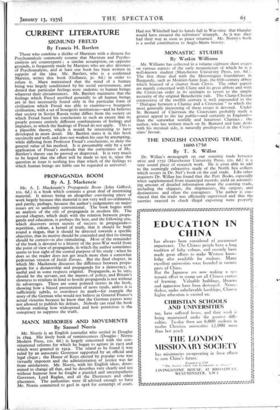CURRENT LITERATURE
SIGMUND FREUD By Francis H. Bartlett
Those who combine a dislike of Marxism with a distaste for Psychoanalysis commonly assume that Marxism and Psycho- analysis are counterparts ; a similar assumption, on opposite grounds, is frequently made by Marxists who are also devotees of Psychoanalysis, and at least one book has been written in support of the idea. Mr. Bartlett, who is a confirmed Marxist, writes this book (Gollancz, 3s. 6d.) in order to refute it. Marx maintained that the mind of a human being was largely conditioned by his social environment, and denied that particular feelings were endemic to human beings whatever their circumstances. Mr. Bartlett maintains that the feelings which Freud ascribed generally to all human beings are in fact necessarily found only in the particular form of civilisation which Freud was able to examine—a bourgeois civilisation, with a set of bourgedis institutions—and he believes that society in Soviet Russia today differs from the society on which Freud based his conclusions to such an extent that its people possess entirely different combinations of feelings and impulses, to which the findings of Freud do not apply. This is a plausible theory, which it would be interesting to have developed in more detail. Mr. Bartlett states it in this book succinctly and well, and does not weaken his case by attempting, while differing from Professor Freud's conclusions, to deny the general value of his method. It is presumably only by a new application of Freud's methods that the correctness of Mr. Bartlett's theory can be proved or disproved. It is very much to be hoped that the effort will be made to test it, since the question at issue is nothing less than which of the feelings to which human beings are liable can be regarded as universal.






































 Previous page
Previous page